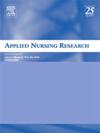Temporal trends in quality of work life, burnout, resilience, and turnover intention among newly employed nurses
IF 2.7
4区 医学
Q1 NURSING
引用次数: 0
Abstract
Aims
As the global nursing shortage continues to worsen, the influence of newly employed nurses' attributes on nurse retention requires attention. This study examined quality of work life (QWL), resilience, and burnout on the turnover intention of new nurses during their first six months of employment.
Methods
A longitudinal study recruited newly employed nurses providing direct patient care in six hospitals across Taiwan. Validated instruments related to QWL, burnout, resilience, and turnover intention collected data at the first, third, and sixth month of employment. Sample characteristics were summarized with descriptive statistics. Longitudinal data was analyzed using generalized estimating equations (GEE) to examine the relationships among the variables and turnover intention.
Results
Newly employed nurses (n = 615) reported moderately high QWL, low resilience, and moderate burnout. Turnover intention increased significantly over six months. Male, older, and unmarried nurses reported greater turnover intention, while high QWL and resilience reduced turnover risk. Emotional exhaustion and depersonalization, two factors contributing to burnout, strongly predicted greater turnover intention.
Conclusion
Turnover intention among new nurses increases in the first six months of employment, influenced by individual and workplace factors. Targeted early interventions to enhance QWL, reduce burnout, and build resilience are critical for improving retention rates among newly employed nurses.
新入职护士工作生活质量、倦怠、心理弹性及离职倾向的时间趋势
目的随着全球护士短缺的持续恶化,新入职护士的属性对护士保留的影响值得关注。本研究考察了新护士入职前六个月的工作生活质量、心理弹性和职业倦怠对离职意向的影响。方法采用纵向研究方法,招募台湾6家医院的新入职护士。与QWL、倦怠、弹性和离职意向相关的验证工具在就业的第一个月、第三个月和第六个月收集数据。用描述性统计方法总结样本特征。采用广义估计方程(GEE)对纵向数据进行分析,探讨各变量与离职意向之间的关系。结果615名新入职护士自我满意度中等,心理韧性低,职业倦怠中等。离职意向在六个月内显著增加。男性、年长和未婚护士报告了更高的离职意向,而高QWL和弹性降低了离职风险。情绪耗竭和人格解体是导致倦怠的两个因素,对离职倾向有较强的预测作用。结论新护士离职意向在入职前6个月呈上升趋势,受个人因素和工作场所因素影响。有针对性的早期干预措施,以提高QWL,减少倦怠,并建立弹性是提高新聘护士的保留率至关重要。
本文章由计算机程序翻译,如有差异,请以英文原文为准。
求助全文
约1分钟内获得全文
求助全文
来源期刊

Applied Nursing Research
医学-护理
CiteScore
4.50
自引率
0.00%
发文量
65
审稿时长
70 days
期刊介绍:
Applied Nursing Research presents original, peer-reviewed research findings clearly and directly for clinical applications in all nursing specialties. Regular features include "Ask the Experts," research briefs, clinical methods, book reviews, news and announcements, and an editorial section. Applied Nursing Research covers such areas as pain management, patient education, discharge planning, nursing diagnosis, job stress in nursing, nursing influence on length of hospital stay, and nurse/physician collaboration.
 求助内容:
求助内容: 应助结果提醒方式:
应助结果提醒方式:


